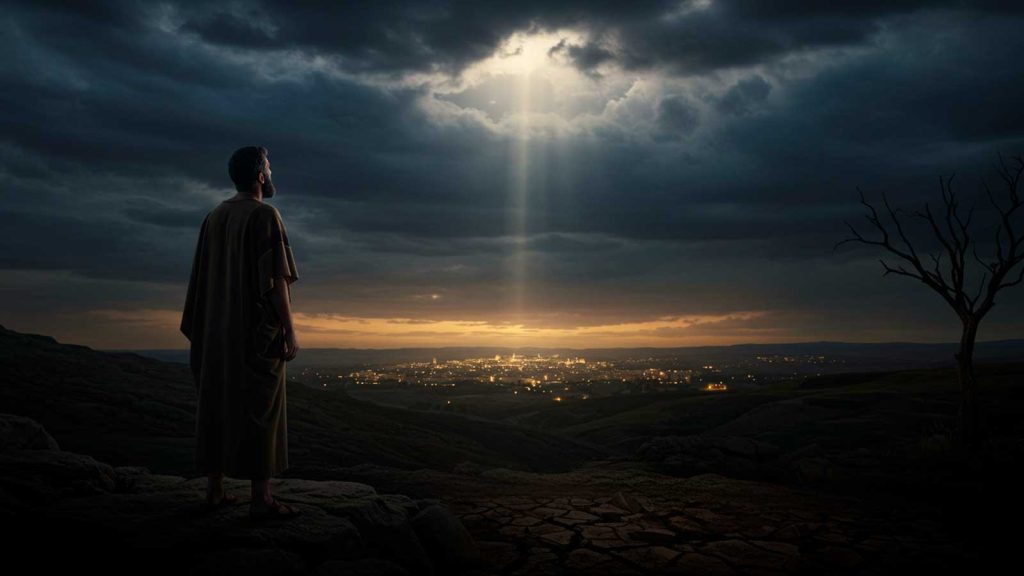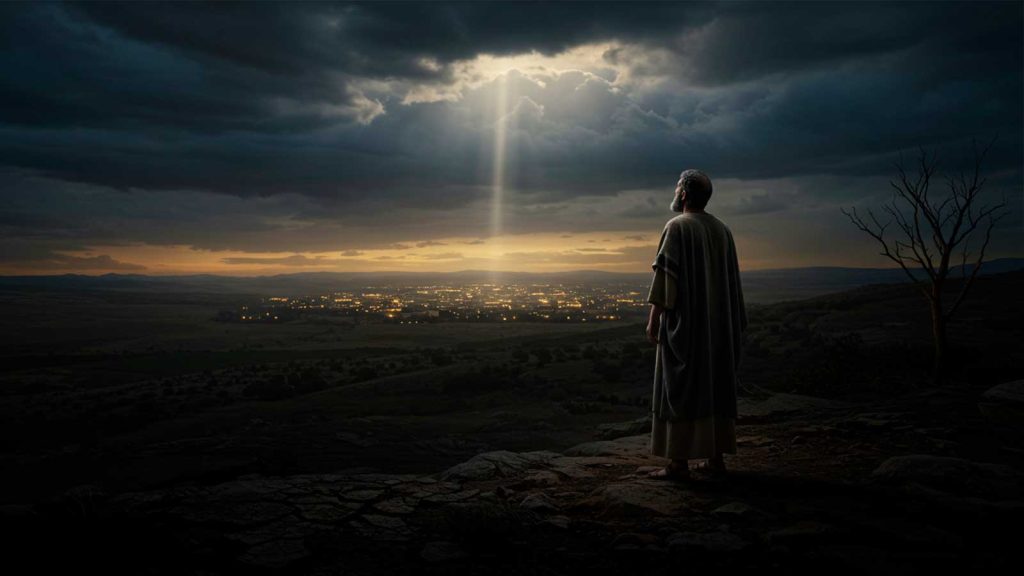The Psalm 14 is one of the most impactful texts in the Bible. In its very first verses, it reveals the corruption of the human heart and invites us to reflect on God’s presence in our choices and thoughts. Throughout this article, you will understand the importance of this psalm, its deeper interpretations, and how it can transform your way of seeing the world around you.
Complete Psalm 14
1 The fool says in his heart: There is no God. They have become corrupt, their deeds are detestable; there is not one who does good.
2 The LORD looked down from heaven upon the sons of men, to see if there were any who understood and sought after God.
3 All have turned aside, together they have become unclean; there is none who does good, not even one.
4 Have not those who practice iniquity learned knowledge? They eat up my people as they eat bread, and do not call on the LORD.
5 There was a fear of great ruin, for God was in the generation of the righteous.
6 You have shamed the counsel of the poor, for the LORD is their refuge.
7 Oh, that the salvation of Israel would come from Zion! When the LORD restores the fortunes of his people, then shall Jacob rejoice, and Israel be glad.

Psalm 14 Explained Verse by Verse
Verse 1
“The fool says in his heart: There is no God. They have become corrupt, their deeds are detestable; there is not one who does good.”
Psalm 14 begins with a strong declaration about the nature of the person who rejects God. The “fool” is described as someone who, even without speaking, internally decides to ignore the existence of the Creator. This leads to a life filled with corruption and condemnable actions. The verse highlights the seriousness of spiritual estrangement, affirming that there is not even one who completely practices good. It is a call to deep reflection about our inner state and our choices.
Verse 2
“The LORD looked down from heaven upon the sons of men, to see if there were any who understood and sought after God.”
God is attentive to humanity. He observes with the desire to find someone who truly understands the importance of seeking Him. This verse reinforces that true wisdom and understanding are linked to spirituality and communion with the Creator. Psalm 14 shows that God cares about our inner attitude and looks for hearts turned toward Him.
Verse 3
“All have turned aside, together they have become unclean; there is none who does good, not even one.”
This verse deepens the spiritual diagnosis of humanity. The deviation from the righteous path has led everyone to moral impurity. The repetition of the idea that “there is not one who does good” reinforces the gravity of the situation. The text reminds us that without the presence of God, humanity loses direction and strays from goodness. Psalm 14 denounces this state while also laying the groundwork for the redemption that will come later.
Verse 4
“Have not those who practice iniquity learned knowledge? They eat up my people as they eat bread, and do not call on the LORD.”
Here, the wicked are described as people who act with cruelty and indifference. They exploit God’s people as if it were something ordinary and trivial. This naturalization of evil reveals a lack of spiritual discernment. The fact that they “do not call on the LORD” shows the absence of faith and communion with God. Psalm 14 warns of the dangers of living a life without reverence and prayer.
Verse 5
“There was a fear of great ruin, for God was in the generation of the righteous.”
Despite the arrogance of the wicked, they will experience fear when they recognize that God is with the righteous. The verse reveals that God’s presence brings security for those who seek Him and instills terror in those who reject Him. Psalm 14 shows that God’s justice is manifest and that the faithful are never alone—God dwells with them and protects them.
Verse 6
“You have shamed the counsel of the poor, for the LORD is their refuge.”
This verse denounces the contemptuous attitude of the wicked toward the poor, who symbolize the humble and those dependent on God. Even when ridiculed, the poor find their refuge in God. Psalm 14 makes it clear that spiritual value is not determined by social status, but by trust in the LORD. Those who take refuge in God will not be put to shame.
Verse 7
“Oh, that the salvation of Israel would come from Zion! When the LORD restores the fortunes of his people, then shall Jacob rejoice, and Israel be glad.”
The psalm concludes with a cry filled with hope. The psalmist earnestly longs for the arrival of redemption, for the complete liberation of the people. The reference to Zion represents the center of God’s presence and spiritual restoration. Psalm 14 concludes on a joyful note, showing that even in the face of corruption and impiety, salvation is certain—and with it will come jubilation and restoration for all of God’s people.

What Does Psalm 14 Say in the Bible?
Psalm 14 was written by David and is found in the Old Testament. It begins with the famous declaration: “The fool says in his heart: There is no God.” This statement already warns us about the path of spiritual folly, showing that distancing oneself from the Creator leads to corruption, injustice, and a lack of wisdom.
The Central Message of Psalm 14
The main point of Psalm 14 is to denounce the behavior of those who live as if God did not exist. The absence of faith results in selfish, harmful, and destructive attitudes. The passage offers both a social and spiritual critique of human behavior, showing that God is always watching those who sincerely seek Him.
The Difference Between the Wise and the Fool According to Psalm 14
In Psalm 14, the fool is the one who denies the existence of God and lives according to his own desires. In contrast, the wise person recognizes his dependence on the LORD and acts justly. The text shows that even if the majority stray from the path of good, there is hope for those who remain faithful.
The Fool Who Denies God
“The fool says in his heart: There is no God.” This phrase reveals more than disbelief—it reflects an attitude of rejecting divine authority. According to Psalm 14, the result is the practice of evil, corruption, and social injustice.
The Righteous Who Trust in God
Those who trust in God are seen as a rarity. The psalm affirms that God looks down from heaven in search of someone who seeks Him. This divine search demonstrates the importance of having a relationship with the Creator.
Psalm 14 in Relation to Current Times
Often, the attitudes described in Psalm 14 can be observed in today’s world. We live in a society that sometimes ignores spiritual principles in favor of momentary pleasures. Therefore, this psalm remains extremely relevant.
Moral Corruption in the Modern World
Just as described in the biblical text, many reject wisdom and give in to behaviors that harm others. Selfishness, deceit, and a lack of compassion are examples that echo the message of Psalm 14.
Hope in God Remains
Despite the difficult scenario described, Psalm 14 ends with a message of hope: “Oh, that the salvation of Israel would come from Zion!” This shows that God does not abandon those who seek Him, and salvation will always be offered to those who desire to live wisely.
Understanding the Historical Context of Psalm 14
David wrote this psalm during a time of great instability. It was a period when many had strayed from the ways of the LORD. Understanding this historical moment helps us apply the psalm’s message more realistically in our lives.
Israel and Its Constant Spiritual Oscillation
The people of Israel often oscillated between periods of faithfulness and rebellion. Psalm 14 emerges as a warning in the face of this fluctuation. David, as a spiritual leader, calls for a return to truth and faith.
The Importance of the Prophet and the King as Spiritual Guides
David, besides being a king, acted as a man of God, guiding the people toward justice. His concern was for the entire nation to recognize the importance of communion with the Creator.

Applying the Teachings of Psalm 14 in Daily Life
Psalm 14 teaches us practical lessons that can be applied right away. Living with faith, practicing kindness, seeking wisdom, and not being influenced by evil are attitudes that transform not only our lives but also our surroundings.
Developing a Life of Wisdom
True wisdom begins with reverence for the LORD. Psalm 14 shows that fools live as if God did not exist, but those who desire to live wisely draw near to Him every day.
Doing Good Even When Most Do the Opposite
Even if everyone around you acts selfishly, you can choose to follow the path of righteousness. This is what differentiates the righteous from the fool, as expressed in the message of Psalm 14.
Comparing Psalm 14 with Psalm 53
Interestingly, Psalm 14 has an almost identical version in Psalm 53. Both emphasize the folly of living without God and describe the corruption of humanity. The repetition of this message shows just how essential it is.
The Repetition of Biblical Messages as Divine Reinforcement
When something is repeated in the Bible, it is a sign that God wants us to pay attention. The fact that Psalm 14 is almost identical to Psalm 53 reinforces the urgency of repentance and the pursuit of holiness.
Daily Meditation Based on Psalm 14
Including Psalm 14 in your daily meditation routine can help strengthen your faith and discernment. It serves as a spiritual mirror that leads us to re-evaluate our paths and attitudes before God.
How to Meditate Using Psalm 14
- Read the psalm aloud in the morning.
- Reflect on which behaviors you need to change.
- Pray, asking for wisdom to live righteously.
- Share this learning with someone.
FAQ about Psalm 14
What is the main message of Psalm 14?
The denunciation of spiritual folly in those who deny the existence of God and the promise of salvation for the righteous.
Who wrote Psalm 14?
The psalm was written by David.
Is Psalm 14 relevant today?
Yes. It addresses themes such as moral corruption and distancing from God, which continue to be present in today’s society.
Is there another psalm similar to Psalm 14?
Yes. Psalm 53 has almost the same structure and message.
What does “the fool says in his heart: There is no God” mean?
It means living as if God did not exist, denying His authority and ignoring His presence.
How can I apply Psalm 14 in my life?
Live wisely, seek justice, avoid bad influences, and cultivate a life of true faith.
What does Psalm 14 say about God?
That He is attentive to humanity, seeking those who sincerely search for Him, and He offers refuge to the righteous.
How does Psalm 14 relate to other biblical texts?
It connects with themes addressed in Proverbs, Ecclesiastes, and the Gospels, especially regarding the teaching on wisdom and true faith.
What is the best translation to read Psalm 14?
The Revised Almeida is widely used, but any translation faithful to the original text can be useful for meditation.
Does Psalm 14 speak about judgment?
Yes, indirectly. It warns of the consequences of living apart from God while also pointing to the hope of salvation.
READ ALSO:
- Psalm 13: Hope That Springs from Sorrow
- Psalm 12: Justice in Times of Lies and Oppression
- Psalm 11: Trust in God Amid Injustices
FOLLOW US ON FACEBOOK
I hope you enjoyed it
Leave your message of faith right below!